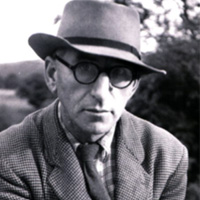Patrick Kavanagh - Biography and Works
Patrick Kavanagh was the outstanding 20th century Irish poet and novelist, born to father James Kavanagh and mother Bridget Quinn. His father was a shoemaker and he learned this skill from his father and also helped him in the farm. He left school at an age of twelve and taught himself about literature. He is best known for his novel Tarry Flynn and the poems "On Raglan Road" and "The Great Hunger" which depict the Irish lifestyle through everyday activities.

Patrick Kavanagh (1904-1967)
Kavanagh was mentored by a great Irish literary figure George William Russell, whose pen name is AE Russell. At first Russell refused to publish Kavanagh’s work and encouraged him to keep on writing better and submitting him. Kavanagh did the same and in 1929 and in 1930 his works were published. Kavanagh further got more mentorship from Russell in Dublin. In 1936, his first collection Ploughman and Other Poems was published. This collection was hugely praised for the realistic presentation of the rustic life of Ireland and also for the rejection of romantic sentiment of the prevailing time. In 1938, when he was in London for five months, he published an autobiographical novel The Green Fool.
In 1942, one of the great poem ‘The Great Hunger’ of Kavanagh was published in a literary magazine The Horizon. It is a long narrative poem about the poverty and sufferings of the rural life and criticizes the society and Catholic Churches in Ireland. The poem speaks the voice of a poor farmer who suffered the great famines of the mid-19th century and devoted himself in improving the farming, serving the old mother and the Catholic Church. The barren land, degrading health of the mother and the moral teaching of the church made him emotionally sad and frustrated. He forsake the happiness of married life and children just for the sake of land, family and religion, but could not get emotional stability. Frustration and terrible anger of a young farmer seen in ‘The Great Hunger’ is highly praised by many critics. But, the Minister for Justice had ordered to seize all the copies of the magazine The Horizon in which the poem was published because the poem was considered to be a vehement attack to the policies of the Churches.
His stay in Dublin was not as pleasant as he thought to be when he left his village and its ignorance. He found the Dubliners and the writers more inclined to sophistication rather than to the improvement of the art and literature. He called them dandies. He was not treated well, instead he was treated as the literate farmer. His talent and skill in writing poetry was underestimated and he felt insulted. He started drinking heavily and this drinking habit further worsen his personality and relationship with the Dublin writers. His dissatisfaction led him to reject the peasant poetry and started writing against the Dublin writers and intellectuals.
In 1954, he was diagnosed with lung cancer and had to remove lung. He did surgery and it was successful.
